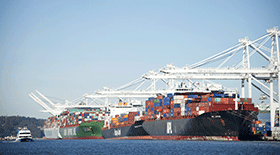The impact of the West Coast port disruption is becoming increasingly dire as the holiday season quickly approaches. The dispute centers on ongoing contract negotiations between the Pacific Maritime Association (PMA) and the International Longshore and Warehouse Union (ILWU).
Negotiations began in May with a six-year contract expiring in July.
White House Petition
The California Chamber of Commerce joined the U.S. Chamber and other business groups this week in signing a petition on the White House website urging President Barack Obama to get involved to end the dispute.
The petition is available at http://petitions.whitehouse.gov.
CalChamber also signed a multi-association letter to the President with manufacturers, farmers, wholesalers, retailers, importers, and transportation and logistics providers to express deep concern about ongoing interruptions at West Coast port terminal operations and to seek help to ensure the situation does not escalate to a complete shutdown of West Coast ports.
Port Activity

About 70% of containerized cargo moves through ports in California, Oregon and Washington.
Cargo congestion has built up at the two busiest U.S. container ports in Southern California in advance of peak cargo season. Management has accused the union of organizing work slowdowns while labor officials cite other factors contributing to delays, such as a shortage of unloading equipment and unusually high cargo traffic at the Los Angeles and Long Beach docks.
Since October 31, a work slowdown by ILWU members in the ports of Tacoma and Seattle has had an impact on the harvest season for Washington state apples, potatoes, Christmas trees and other perishable produce.
More recently, longshoremen on several shifts have walked off the job in Oakland. In the critical ports of Los Angeles and Long Beach, there is growing congestion. Retailers point out that there are toys on those docks that need to be in homes for December gift exchanges.
The ILWU represents 20,000 West Coast full- and part-time dockworkers.
Jobs Impact
Port activity at ILWU marine terminals supported near 3.7 million California jobs in 2013, and contributed $742.8 billion to the state’s economy, about 37% of gross state product, according to a study prepared for PMA and released in April.
The principal business of the PMA is to negotiate and administer maritime labor agreements with the ILWU. This includes a coast-wide contract covering longshore, clerk and foreman workers at 29 ports along the West Coast, from Southern California to the Pacific Northwest.
Calls to Resolve Contract
PMA spokesman Wade Gates has called upon the ILWU to agree to a temporary contract extension while the two sides continue to work on a new agreement. The extension and a full return to work would give everyone—from shippers to consumers—the confidence needed before the critical holiday shopping season, Gates said.
Representatives from major U.S. manufacturing and shipping trade groups have met with White House officials to ask for a federal negotiator to intervene in the months-long labor dispute that has slowed West Coast ports.
The six U.S. senators from California, Washington and Oregon sent an open letter to both sides, asking them to resolve the contract negotiations in order to ensure the “health, safety and economic well-being of the 13,600 longshore, clerk, and foreman workers … as well as for companies large and small, agriculture producers, ports, and international buyers around the world.”
Letter to President
The multi-association letter to the President states that the threat of a West Coast port shutdown is creating high levels of uncertainty in a fragile economic climate, which has forced many businesses to once again undertake contingency plans that come at a significant cost to jobs and the state’s economic competitiveness.
The West Coast lockout 12 years ago cost the U.S. economy $1 billion a day. It took half a year for the ports to clear the backlog and recover from this 10-day shutdown.
A shutdown now could be even more costly. A study released in June by the National Association of Manufacturers and the National Retail Federation anticipates impacts at a much greater cost in 2014—nearly $2 billion in daily costs to the economy for a five-day interruption.
The organizations believe that both parties can reach an agreement that will ensure the continued success and competitiveness of these ports for the foreseeable future, without any shutdowns or further disruptions.

